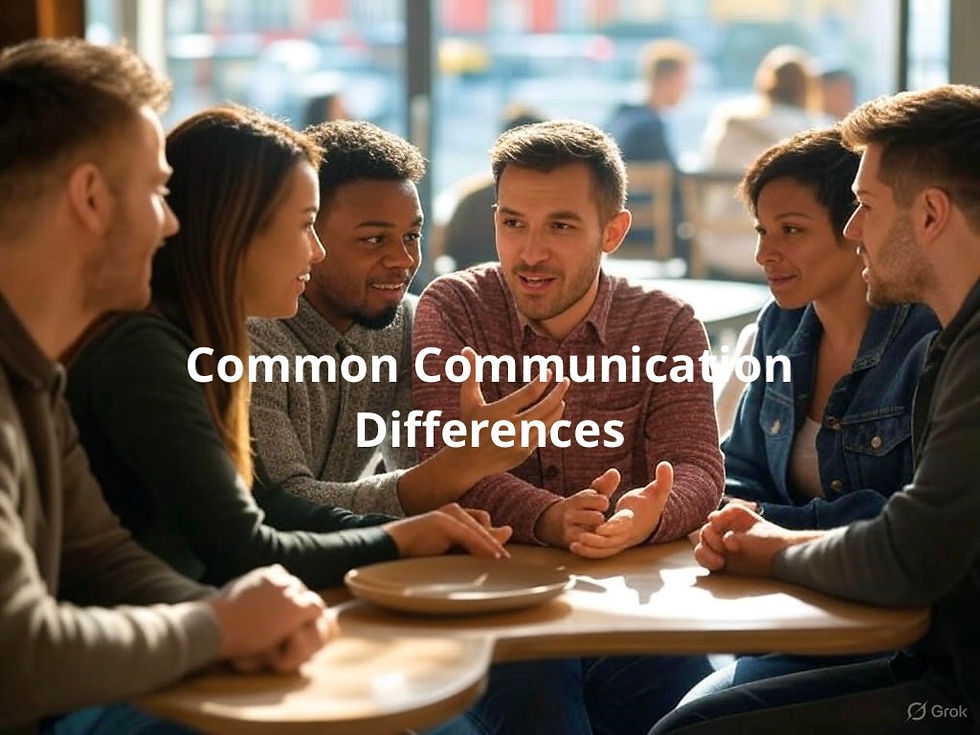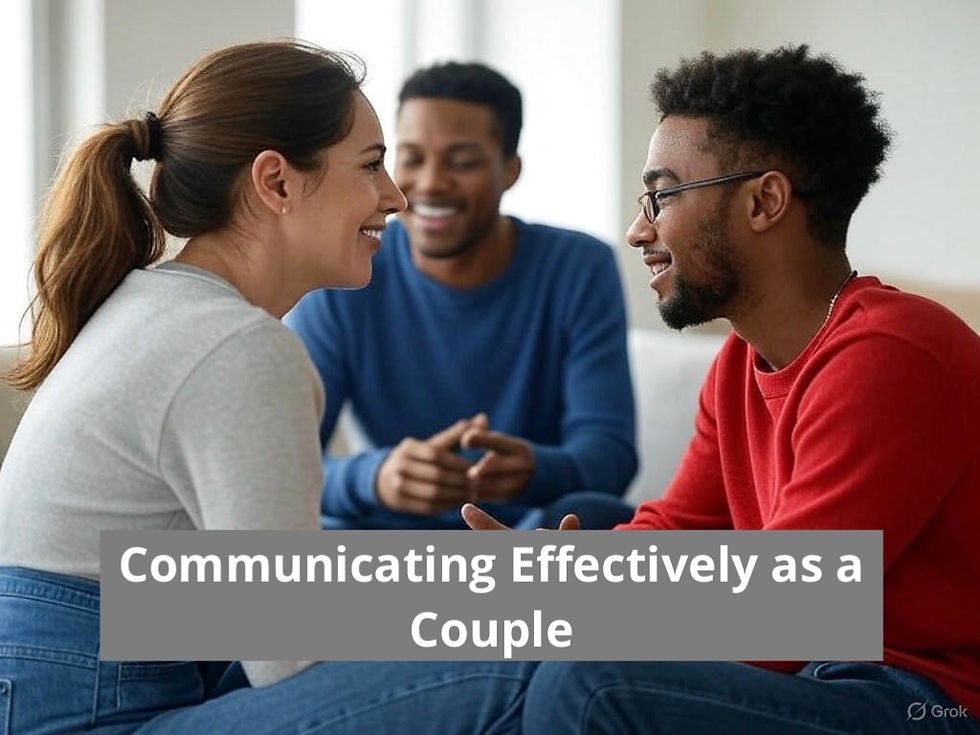Unlocking Deeper Connection: Effective Communication for Couples
- Christine Marie
- Apr 23, 2025
- 8 min read
Updated: Dec 21, 2025

Hello, beautiful souls! I’m Psychic Medium Christine Marie, based in the heart of Langley, BC, and I’m thrilled to share my passion for helping couples forge deeper, more meaningful connections through the art of communication. As an empathic psychic medium, I have a unique gift: I can sense the unspoken energies, emotions, and even fears that linger beneath words, often creating invisible barriers between partners. My mission is to guide you toward understanding, intimacy, and trust, especially in the dynamic and sometimes challenging relationships of those aged 20 to 40.
Did you know that how you communicate in your 20s and 30s can shape the entire future of your romantic relationship? It’s true! Yet, so many couples struggle to truly hear each other, particularly when one partner is private or reserved. Relationships in this age range are a beautiful dance of balancing career ambitions, personal growth, and evolving emotional needs. Misunderstandings can arise, but they also hold the potential to become pathways to profound connection.
In this blog, I’ll share insights on common communication differences, how to recognize them, and practical exercises to help couples—especially those with reserved partners—build trust and open up. I’ve also included a special cheat sheet of conversation prompts to spark heartfelt discussions. Let’s dive in and unlock the magic of connection together!

Common Communication Differences in Relationships
Every couple’s communication style is as unique as their love story, shaped by life stages, personalities, and cultural influences. For those in their 20s and 30s, these differences can be particularly pronounced as you navigate independence, commitment, and vulnerability.
In your early 20s (20–25), relationships often feel like an exciting adventure of self-discovery. Communication tends to be casual, leaning heavily on texting or social media, and sometimes less emotionally open. This can stem from inexperience or a fear of rejection—after all, opening your heart is a brave step!
By your late 20s (26–32), you might be transitioning into deeper commitments like moving in together or planning a future. Conversations often shift to practical matters—finances, career goals, or logistics—which can unintentionally sideline emotional intimacy.
In your 30s (33–40), you’re likely more established, with greater emotional maturity, but old habits or past hurts can make it harder for reserved partners to share their feelings openly.
Now, let’s consider couples in their 50s and beyond (50+). At this stage, you’ve often built a rich tapestry of shared experiences—decades of memories, challenges, and joys. Communication can become deeply nuanced, reflecting a lifetime of growth together. Many couples find their conversations focus on legacy, health, and rediscovery, such as planning for retirement, reconnecting after the kids have moved out, or exploring new hobbies together. There’s often a greater sense of patience and understanding, born from years of navigating life’s ups and downs. However, challenges can arise if one partner becomes more reflective and wants to discuss emotions or past unresolved issues, while the other may prefer to focus on the present or avoid heavy topics altogether. For example, I’ve worked with couples where one partner wants to reminisce about their shared history to feel closer, while the other feels hesitant, perhaps due to lingering grief or fear of confronting past mistakes. This can lead to a beautiful opportunity for growth, as partners learn to honor each other’s pace and emotional needs.
Personality plays a big role at any age. Extroverted partners might dominate conversations, eager to express every thought, while introverted or reserved partners may withdraw, leading to misunderstandings.
Cultural backgrounds add another layer—some cultures favour indirect communication through non-verbal cues, while others value explicit expression, which can cause friction if partners are misaligned.
Why does this matter? When communication styles don’t sync, it’s easy to feel unheard, leading to resentment or emotional distance. This is especially true if one partner is private, bottling up their emotions—whether they’re in their 20s, 30s, or 50s. But don’t worry—understanding these differences is the first step to bridging the gap, no matter what stage of life you’re in.
Recognizing Communication Differences
So, how do you know if communication is off-balance in your relationship? Look for these signs: Does one partner talk more while the other listens passively? Are there frequent interruptions or assumptions about what the other means? Do emotional discussions cause a reserved partner to shut down? Pay attention to non-verbal cues too—crossed arms, lack of eye contact, or a tense tone can say more than words.
To spot these differences, try these steps:
Observe Patterns: Does one partner avoid deep topics or use humor to deflect?
Check Reactions: Is one partner frustrated or disengaged when the other speaks?
Reflect on Triggers: When does communication break down—during stress, conflict, or certain topics?
As an empathic psychic medium, I often sense the emotional undercurrents behind these patterns. For example, during a session, I might feel a reserved partner’s fear of vulnerability, even if they’re not ready to voice it. This insight helps me guide couples toward understanding what’s truly going on beneath the surface, paving the way for more open communication.

Effective Listening and Understanding Your Partner
At the heart of every strong relationship is the ability to listen—truly listen. Effective listening isn’t just hearing words; it’s about connecting with your partner’s heart. Here are some key principles:
Active Listening: Give your full attention, maintain eye contact, and nod to show you’re engaged. Resist the urge to plan your response while they’re speaking.
Empathy: Put yourself in their shoes and acknowledge their emotions, even if you don’t agree. Try saying, “I see this is really hard for you.”
Clarification: Ask open-ended questions like, “Can you tell me more about what you mean?” to ensure you understand.
Non-Verbal Awareness: Notice their body language and tone, which often reveal more than words.
Listening to a reserved partner can be trickier. Private individuals might fear judgment or feel overwhelmed by emotional discussions, needing more time to process their feelings. To help them feel safe:
Create a non-judgmental space by affirming their emotions: “I’m here when you’re ready to share.”
Be patient and avoid pushing for immediate answers.
Use gentle prompts to encourage sharing (more on this in the cheat sheet below).
In my readings, I connect with a partner’s emotional energy, often sensing what they struggle to express. This allows me to offer compassionate guidance, helping couples approach conversations with patience and understanding.

Communicating Effectively as a Couple
Great communication is like a dance—it takes practice, rhythm, and trust. Here are some core techniques to strengthen your connection:
Use “I” Statements: Express feelings without blaming, like “I feel hurt when…” instead of “You always…”
Practice Reflective Listening: Paraphrase what your partner says to confirm understanding, such as “So you’re saying you feel overwhelmed?”
Avoid Absolutes: Words like “always” or “never” can escalate conflict, so focus on specifics.
Express Gratitude: Regularly share appreciation, like “I love how you support me,” to build positivity.
Helping a reserved partner open up requires extra care. Build trust by consistently showing their feelings are valued and won’t be judged. Start with low-stakes topics, like “What’s something you enjoyed today?” to ease them into sharing. Non-verbal cues, like a warm touch or eye contact, can signal safety. Modeling vulnerability by sharing your own feelings first can also show them it’s okay to open up.
In my private sessions, I use my clairvoyant and clairsentient abilities to identify emotional blockages. For instance, I might sense a partner’s unspoken fear of rejection and offer tailored advice to create a safe space for openness. This intuitive approach helps couples communicate authentically, even when words are hard to find.

Communication Exercises for Couples
Ready to put these ideas into practice? Here are three powerful exercises to deepen your connection:
Exercise 1: The 40-20-40 Process
Purpose: Ensure both partners feel heard.
How to Do It: Set aside 10 minutes. For the first 4 minutes (40%), Partner A speaks without interruption, sharing feelings or thoughts using “I” statements. For the next 4 minutes (40%), Partner B speaks. Use the final 2 minutes (20%) to discuss the relationship together, avoiding accusations.
Benefit: Encourages compassionate listening and equal sharing, perfect for reserved partners who need space to express themselves.
Exercise 2: Uninterrupted Listening
Purpose: Build trust and empathy.
How to Do It: Set a timer for 3–5 minutes. One partner speaks about a topic (e.g., a recent challenge) while the other listens silently. The listener then reflects back what they heard, like “You felt stressed because…” Switch roles and repeat.
Benefit: Helps reserved partners feel safe sharing without fear of interruption.
Exercise 3: Extended Eye Contact
Purpose: Foster non-verbal connection.
How to Do It: Sit facing each other in a quiet space and maintain eye contact for 4–5 minutes without speaking. Afterward, discuss how it felt and any emotions that arose.
Benefit: Builds intimacy, especially for reserved partners who find verbal expression challenging.
As your guide, I can lead you through these exercises in a session, using my empathic abilities to sense when one partner feels uneasy, ensuring a safe and productive experience.
Communication Cheat Sheet for Couples
To spark meaningful conversations, especially with reserved partners, I’ve created a cheat sheet of prompts. Choose 1–2 prompts per week to discuss during a quiet moment, like over dinner or a walk. Take turns answering and practice active listening.
Here are 10 prompts to get you started:
Daily Check-In: “What was the best part of your day, and why?”
Emotional Sharing: “What’s something you’ve been feeling lately but haven’t shared?”
Gratitude: “What’s one thing I do that makes you feel loved?”
Future Dreams: “Where do you see us in five years, and what excites you about that?”
Vulnerability: “What’s something you find hard to talk about, and how can I support you?”
Conflict Resolution: “When we disagree, what’s one thing I could do to make you feel heard?”
Fun Connection: “What’s a memory of us that always makes you smile?”
Needs: “What’s one thing you need from me right now to feel closer?”
Reflection: “What’s something you’ve learned about yourself through our relationship?”
Open-Ended: “What’s on your heart today?”
Tips: Start with light prompts (like #1 or #7) to ease reserved partners into sharing. Respond with empathy, saying things like, “Thank you for sharing; I appreciate that.” If they’re hesitant, don’t push—revisit the prompt later.
How Psychic Medium Christine Marie Can Help
As an empathic psychic medium, I bring a unique perspective to helping couples communicate. My clairvoyant visions and clairsentient sensations allow me to connect with the energies and emotions of both partners, even those who struggle to articulate their feelings. I can sense underlying fears, desires, or past experiences that shape how you communicate, offering insights to address the root causes of any issues.
I offer several services to support your journey:
Private Psychic Readings (online or in person): I explore each partner’s emotional landscape, providing guidance on how to communicate effectively. For example, I might sense a reserved partner’s fear of vulnerability and suggest ways to create safety.
Mediumship Readings (online or in person): If past losses, like family dynamics, affect communication, I can connect with loved ones in spirit to provide closure, helping partners open up.
Couples Sessions (online or in person): I guide you through communication exercises, using my abilities to ensure both partners feel heard and understood.
During a session, I might see a vision of a partner’s past experience that makes them guarded or feel their unspoken love, helping you navigate sensitive topics with compassion. To book a session or learn more, visit PsychicMediumCM.com. My practice is located at 200th & 56th Ave, Langley, BC.
One of my clients shared, “Christine helped us see what we couldn’t say. Her guidance made my partner feel safe to share, and now we’re closer than ever.” I’d love to help you experience that same breakthrough!
Conclusion
Effective communication is the heartbeat of a thriving relationship. By understanding your unique communication differences, listening with empathy, and practicing exercises like the 40-20-40 process or uninterrupted listening, you can build trust and intimacy, even with a reserved partner.
The cheat sheet prompts are a simple yet powerful way to start meaningful conversations and deepen your bond.
I invite you to try one exercise or prompt this week and notice how it transforms your connection. For personalized guidance, book a session with me, Psychic Medium Christine Marie, to unlock the emotional energies holding you back.
Communication is a journey of discovery, and with patience, empathy, and a touch of psychic insight, you and your partner can create a relationship that’s not just strong but soulfully connected.
Visit PsychicMediumCM.com to start your journey today.
Here’s to love, understanding, and the magic of truly hearing each other!
Love and Light,
Christine Marie






.png)




Comments